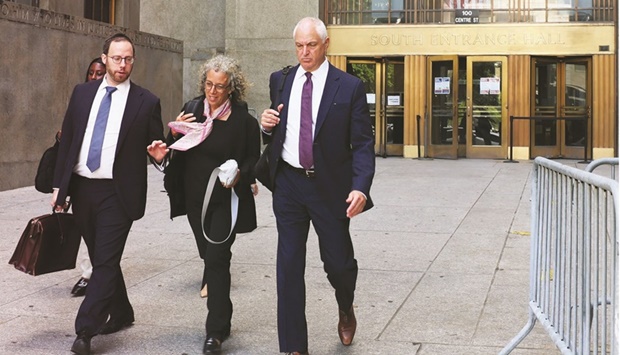Former President Donald Trump’s attorneys yesterday opposed the US Justice Department’s request to continue to examine the contents of classified documents seized by the FBI from his Florida estate last month in an ongoing criminal investigation.
In a court filing, his lawyers also asked US District Judge Aileen Cannon to include the roughly 100 documents marked as classified that were among more than 11,000 records recovered in the court-approved Aug. 8 search in an upcoming review of the material by an independent arbiter, called a special master. In another development, the Justice Department has charged a Texas woman who prosecutors accused of making phone threats against Cannon including saying the judge was “marked for assassination.” The incident marks the latest example of threats reported against various federal authorities in recent months.
Trump is under investigation by the Justice Department for retaining government records — some of which were marked as highly classified, including “top secret” — at his Mar-a-Lago estate in Palm Beach after leaving office in January 2021. The department is also examining possible obstruction of the probe.
The special master, who has yet to be named, could exclude the department from using certain documents. FBI agents retrieved the records during a court-approved Aug. 8 search.
Cannon previously blocked the department from immediately using the seized records in the investigation, a move that will slow down the work of prosecutors and make it harder for them to determine whether additional classified materials could be missing.
Trump’s lawyers in yesterday’s filing said he disputes the department’s claim that the roughly 100 documents at issue are in fact classified, and they reminded Cannon that a president generally has broad powers to declassify records. They stopped short of suggesting that Trump had declassified the documents, a claim he has made on social media but not in court filings.
“There still remains a disagreement as to the classification status of the documents,” Trump’s lawyers wrote. “The government’s position therefore assumes a fact not yet established.”
If the judge rules that the Justice Department cannot continue relying on the classified materials for its criminal probe or insists on letting the special master review them, prosecutors have vowed to appeal to a higher court. “In what at its core is a document storage dispute that has spiralled out of control, the government wrongfully seeks to criminalise the possession by the 45th President of his own presidential and personal records,” Trump’s lawyers wrote.
“The government should therefore not be permitted to skip the process and proceed straight to a preordained conclusion,” they added.
The documents probe is one of several federal and state investigations Trump is facing from his time in office and in private business. He has suggested he might run for president again in 2024.
Following the search, Trump’s attorneys sought the appointment of a special master to review the seized records for materials that could be covered by attorney-client privilege or executive privilege — a legal doctrine that can shield some presidential records from disclosure. In ruling in favour of Trump’s request last week, Cannon rejected Justice Department arguments that the records belong to the government and that because Trump is no longer president he cannot claim executive privilege. Cannon was appointed to the bench by Trump in 2020.
If the special master decides some of the material is covered by Trump’s privilege claims, it could hamper the government’s investigation.
The Justice Department on Friday proposed retired federal judges Barbara Jones and Thomas Griffith to serve as special master, while Trump’s team proposed federal judge Raymond Dearie and Paul Huck, Florida’s former deputy attorney general. The two sides are expected to give the judge later their views on each other’s proposed candidates.

Alan Futerfas (right), a lawyer for the Trump Organisation, leaves with other lawyers after a pretrial hearing at New York State Supreme Court, yesterday.
